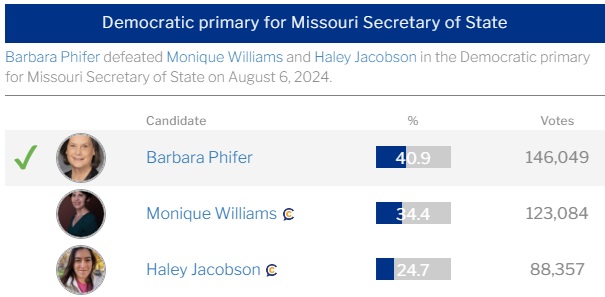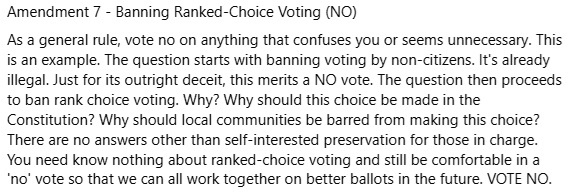Ranked Voting: The Case for Democrats
Democrats are Already Using Ranked Choice Voting
Democrats in Missouri were planning to use ranked choice voting in the 2024 primary, but the national party asked them to wait until next cycle. (Ranking does need at least three candidates before it can be different from the current system).
Democrats in Kansas did use ranked choice voting in 2020 and 2024 presidential primaries.
This explains how ranked choice voting works as used by Democrats for special elections in Pittsburg:
One MO Primary Illustrating Ranked Voting for Democrats

In the other Democratic primary races, the candidate who won did so with a majority of the vote. They had their majority support, and ranking would therefore have made no difference in those races. The Republicans had far more races where the candidate won with less than half the vote (in the case of secretary of state, with less than a quarter).
But in this race, the winner had only 41% of the vote. If these were the same as those ranked first, Jacobson would be the one dropped in the first round. With only two left, the winner would have been decided in the second round. So the second rankings for Jacobson would have gone to either Phifer or Williams.
If half or most went to Phifer, she’d have a majority, could claim majority support, and therefore could make a stronger general election pitch.
But if 65,400 – around three quarters – of Jacobson’s votes selected Williams as their second choice, then Williams would have won.
We have enough experience with cities who use ranking to know that about 4 times in 5, the candidate who gets the most votes in the first round also gets the most in the final round. So it’s most likely Phifer would have won.
But there was a majority of voters who were divided between Williams and Jacobson, so the majority didn’t get to choose who the final winner was. And in just under 1 case in 5, the final winner is different from the votes in the first round. Those are the cases you need to worry about – you don’t want to send candidates to the general election that don’t have the support of a majority of Democrats.
Benefits to Candidates and Voters of Color
From a report looking at our experience where it’s already used.
Voters of color tend to rank more candidates than White voters.
In precincts with more voters of color, voters rank a higher percentage of candidates, indicating a willingness among communities of color to engage with the ranked ballot.
Candidates pay no penalty when they run against opponents of the same race or ethnicity.
Black candidates are more likely than other candidates to challenge people of the same race or ethnicity, but under RCV they don’t pay a penalty for doing so. Instead of dividing community support, Black candidates who run against other Black candidates in RCV elections have a higher win rate.
Candidates of color benefit from the round-by-round counting process.
Winning candidates of color, particularly those who are Black or Hispanic, grew their vote totals between the first and final ballot rounds at a higher rate than winning White candidates.
Organizational endorsements of a No Vote on Amendment 7 (to ban ranking) include:
“This amendment would create an additional barrier to potential future efforts to change the way we conduct elections. St. Louis City is already using approval voting to make sure the person elected to a position has the support of the majority of voters. The amendment also changes the Constitution to remove the guaranteed right of ALL citizens to vote and instead makes it a restriction so that only citizens can vote. This could mean future efforts to remove the vote from some citizens.
The bottom line is this – some legislators are trying to silence the voices of people who disagree with them. We will not be silenced and we will fight to preserve our voice.”
League of Women Voters of Missouri:

. . .

